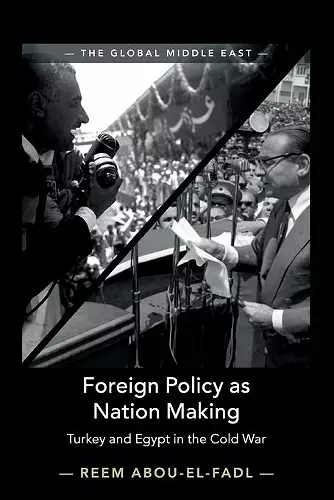Foreign Policy as Nation Making
Turkey and Egypt in the Cold War
Format:Paperback
Publisher:Cambridge University Press
Published:18th Jun '20
Currently unavailable, and unfortunately no date known when it will be back
This paperback is available in another edition too:
- Hardback£63.00(9781108475044)

A comparison of Turkey's and Egypt's diverging foreign policies during the Cold War in light of their leaderships' nation making projects.
Turkey's and Egypt's foreign policies in the 1950s present a puzzle, with the Turkish Democratic Party pursuing NATO membership and sponsoring the pro-Western Baghdad Pact, while Egypt's Free Officers promoted neutralism and pan-Arab alliances. Abou-El-Fadl argues that the answer to this lies in the two leaderships' contrasting nation making projects.After the Second World War, Turkey and Egypt were among the most dynamic actors in the Middle East. Their 1950s foreign policies presented a puzzle, however: Turkey's Democrat Party pursued NATO membership and sponsored the pro-Western Baghdad Pact regionally, while Egypt's Free Officers promoted neutralism and pan-Arab alliances. This book asks why: what explains this divergence in a shared historical space? Rethinking foreign policy as an important site for the realisation of nationalist commitments, Abou-El-Fadl finds the answer in the contrasting nation making projects pursued by the two leaderships, each politicised differently through experiences of war, imperialism and underdevelopment. Drawing on untapped Turkish and Arabic sources, and critically engaging with theories of postcolonial nationalism, she emphasises local actors' agency in striving to secure national belonging, sovereignty and progress in the international field. Her analysis sheds light on the contemporary legacies of the decade which cemented Turkey's position in the Western Bloc and Egypt's reputation as Arab leader.
'Reem Abou-El-Fadl's fine comparative study of Egyptian and Turkish foreign policy in the early Cold War throws penetrating new light on how foreign policy can serve national development strategies in LDCs [Least Developed Countries]. Using an innovative theoretical framework that links theories of IR [International Relations] and nationalism, it also breaks new theoretical ground that can be usefully applied to other cases.' Raymond Hinnebusch, University of St. Andrews
'This historically grounded, empirically rich and thoroughly comparative analysis of the interplay between foreign policy-making and national self-fashioning in Egypt and Turkey during the 1950s offers a challenging new perspective that scholars of international relations and comparative politics would do well to engage with.' Zachary Lockman, New York University
'In this empirically rich and theoretically sophisticated study, Reem Abou-El-Fadl shows that the diametrically opposed positions Egypt and Turkey assumed vis-à-vis the west in the 1950s derived directly from their respective projects of nation making. El-Fadl's book is an essential reading for anyone who wants to understand the link between domestic and international politics in Global South, both in the twentieth and in the twenty-first century.' Resat Kasaba, University of Washington
ISBN: 9781108468442
Dimensions: 150mm x 230mm x 15mm
Weight: 530g
383 pages